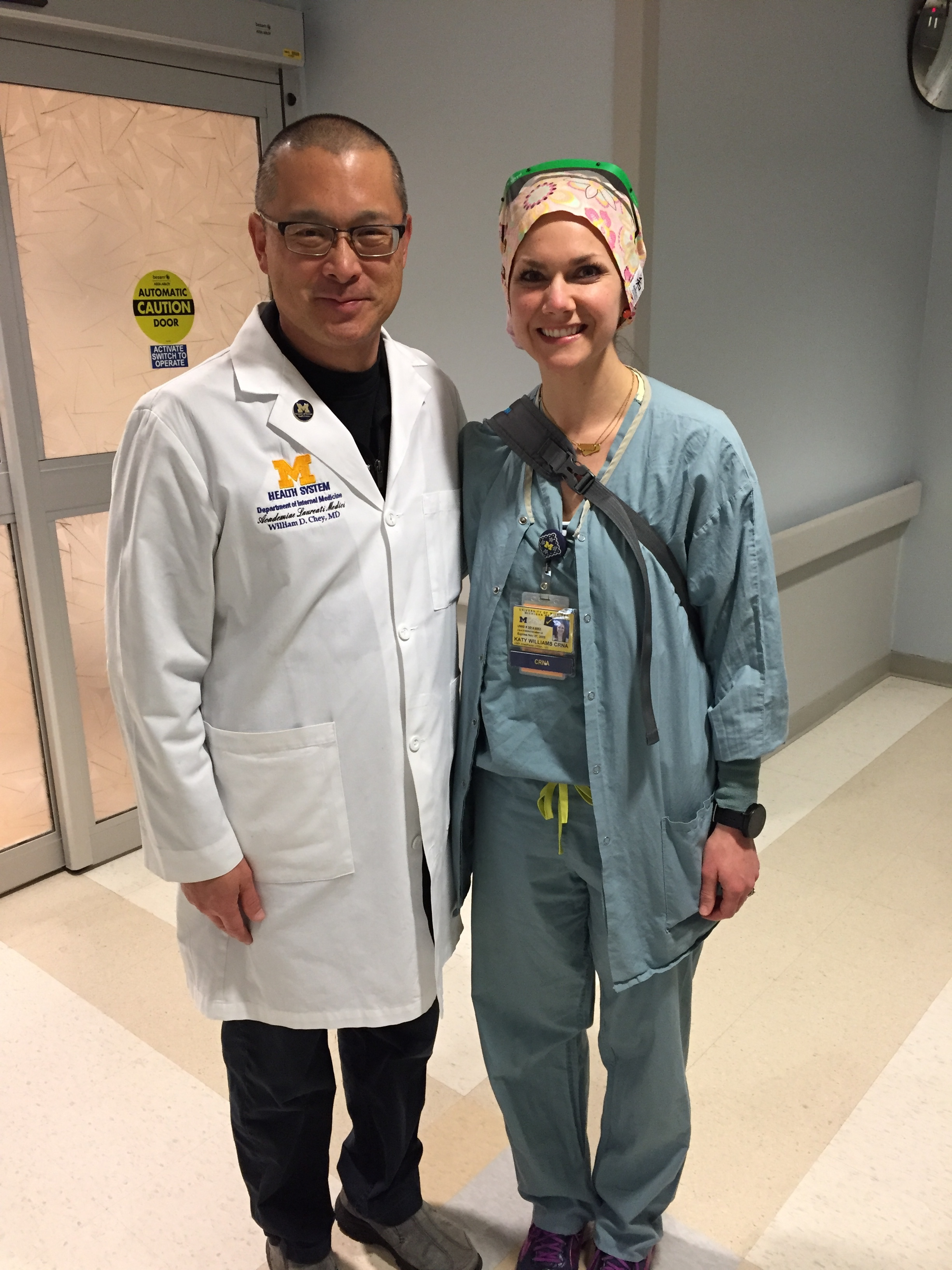As part of the #IBelieveinyourStory campaign and IBS awareness month, I will share different digestive health stories during the month of April. Today’s story is from Katy.
Pictured: Katy and Dr. William Chey from University of Michigan.

Katy’s story:
“I met Dr. Chey while working as a medical assistant in the Medical Procedures Unit (MPU) at UofM when I was in nursing school. I always had a “sensitive” stomach, most likely IBS, as diagnosed by other physicians throughout my childhood. The summer of 2006 was quite different, though. I could never be far from a bathroom, and I lost 10-15 lbs in a matter of just three months. I finally got up the courage to ask Dr. Chey for some advice. Lucky for me, he was doing a study on gastrointestinal disorders using a blood test. Turns out, I got paid $20 to be in the study, and I received my diagnosis of celiac disease which has ultimately changed my life for the better. Most people wouldn’t see this as a good thing, but I feel extremely fortunate to have discovered my diagnosis in just three short months, and I am able to control my symptoms on diet alone without any medications. I immediately felt like a completely new person, and my diagnosis has completely changed how I view gut health and what I am putting in my body. I am forced to read labels, and I live my life by eating whole, unprocessed foods. My energy levels have drastically improved, and I have also had improvements in my hemoglobin, iron, and cholesterol levels. Fast forward to twelve years later, and I am now a CRNA at UofM where I was lucky enough to run into Dr. Chey while providing anesthesia for his patients. Coming full circle, I can’t tell him enough how grateful I am for his diagnosis so long ago that has completely changed my life in the best way.”
Celiac disease is an immune mediated condition that can present with similar symptom as IBS.
A blood test can screen for celiac disease but consumption of gluten containing foods in the diet is necessary. For this reason, I encourage my IBS clients to do the celiac blood screening test prior to engaging in the low FODMAP diet. Although the low FODMAP diet is not gluten free, it does reduce gluten intake significantly.
As part of the #IBelieveinyourStory campaign, learn more about what Dr. Chey’s lab at University of Michigan is doing in the area of diet and IBS treatments. Consider donating to his research lab>>please click here.
Oh….and good news…Dr. Chey has a matching donor up to $125K!
This means for every dollar you donate–it will be doubled. 🙂

Patricia
In the story above:
A blood test can screen for celiac disease but consumption of gluten containing foods in the diet is necessary.
I thought you had to avoid gluten if you had celiac disease.
katescarlata
Correct, you need to follow a gluten free diet if you have celiac disease. Testing for celiac disease, however, requires consumption of gluten for accurate testing. If you are found to have celiac disease–a STRICT gluten free diet is then required. This means you only use a toaster that is used with gluten free toast, you have a special cutting board for gluten free foods, you follow a strict protocol to avoid any cross contamination with gluten. A couple crumbs of wheat can trigger an reaction in someone with celiac disease. There are many people that come to my practice following a reduced gluten intake. This is because another practitioner has suggested this for treatment of their GI symptoms. I think testing for celiac disease properly is very important–rather than sort of doing a gluten free diet on your own. Does that help?